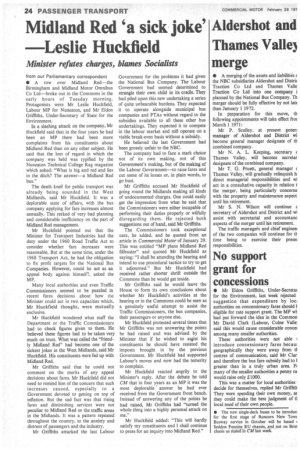Midland Red 'a sick joke ,
Page 26

If you've noticed an error in this article please click here to report it so we can fix it.
Leslie Huckfield
Minister refutes charges, blames Socialists
from our Parliamentary correspondent • A row over Midland Red—the Birmingham and Midland Motor Omnibus Co Ltd—broke out in the Commons in the early hours of Tuesday morning. Protagonists were Mr Leslie Huckfield, Labour MP for Nuneaton, and Mr Eldon Griffiths, Under-Secretary of State for the Environment.
In a slashing attack on the company, Mr Huckfield said that in the four years he had been an MP there had been more complaints from his constituents about Midland Red than on any other subject. He said that the loss of regard in which the company was held was typified by the Nuneaton Technical College Rag magazine which asked: "What is big and red and lies in the ditch? The answer—a Midland Red bus."
The death knell for public transport was already being sounded in the West Midlands, said Mr Huckfield. It was a deplorable state of affairs, with the bus company applying for fare increases almost annually. This reeked of very bad planning and considerable inefficiency on the part of Midland Red management.
Mr Huckfield pointed out that the Minister for Transport Industries had the duty under the 1960 Road Traffic Act to consider whether fare increases were reasonable. But at the same time, under the 1968 Transport Act, he had the obligation to fix profit targets for the National Bus Companies. However, could he act as an appeal body against himself?, asked the MP.
Many local authorities and even Traffic Commissioners seemed to be puzzled in recent fares decisions about how the Minister could act in two capacities which, Mr Huckfield thought, were mutually exclusive.
Mr Huckfield wondered what staff the Department or the Traffic Commissioners had to check figures given to them. He believed these figures had to be taken very much on trust. What was called the "friendly Midland Red" had become one of the sickest jokes in the West Midlands, said Mr Huckfield. His constituents were fed up with Midland Red.
Mr Griffiths said that he could not comment on the merits of any appeal decisions about fares. Mr Huckfield did not need to remind him of the concern that such increases caused, especially to a Government devoted to getting on top of inflation. But the sad fact was that rising fares and diminishing services were not peculiar to Midland Red or the traffic areas in the Midlands. It was a pattern repeated throughout the country, to the anxiety and distress of passengers and the industry.
Mr Griffiths attacked the last Labour Government for the problems it had given the National Bus Company. The Labour Government had seemed determined to strangle their own child in its cradle. They had piled upon this new undertaking a series of quite unbearable burdens. They expected it to operate alongside municipal bus companies and PTAs without regard to the subsidies available to all these other bus undertakings. They expected it to compete in the labour market and still operate on a viable break-even basis without a subsidy.
He believed the last Government had been grossly unfair to the NBC.
The company had to face a stark choice not of its own making, not of this Government's making, but of the making of the Labour Government—to raise fares and cut some of its losses or, in plain words, to go bust.
Mr Griffiths accused Mr Huckfield of going round the Midlands making all kinds of undocumented charges. One could easily get the impression from what he said that the Commissioners were either incapable of performing their duties properly or wilfully disregarding them. He rejected both suggestions out of hand, said Mr Griffiths.
The Commissioners took exceptional care, he added, and he quoted from an article in Commercial Motor of January 29. This was entitled "MP plans Midland Red filibuster" and quoted Mr Huckfield as saying: "I shall be attending the hearing and intend to use procedural tactics to try to get it adjourned." But Mr Huckfield had received rather shorter shrift outside the Commons than he would get inside.
Mr Griffiths said he would leave the House to form its own conclusions about whether Mr Huckfield's activities at the hearing or in the Commons could be seen as a genuinely useful attempt to assist the Traffic Commissioners, the bus companies, their passengers or anyone else.
Mr Huckfield protested several times that Mr Griffiths was not answering the points he had raised and was advised by the Minister that if he wished to astsist his constituents he should have resisted the imposts brought in by the previous Government. Mr Huckfield had supported Labour's moves and now had the temerity to complain.
Mr Huckfield reacted angrily to the Minister's reply. After the debate he told CM that in four years as an MP it was the most deplorable answer he had ever received from the Government front bench. Instead of answering any of the points he had raised, Mr Griffiths had "turned the whole thing into a highly personal attack on me."
Mr Huckfield added: "This will hardly satisfy my constituents and I shall continue to press for an inquiry into Midland Red."




























































































